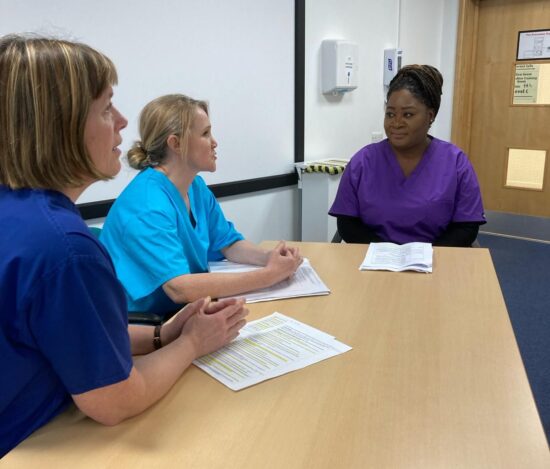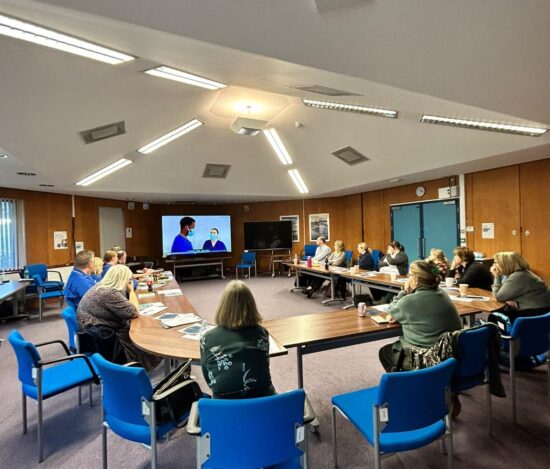Giving UK health professionals the skills to be excellent allies to internationally educated registrants
In an increasingly interconnected world, international migration has become a defining factor in shaping the global healthcare workforce. In the United Kingdom (UK), the influx of internationally educated nurses, midwives, and allied health professionals (AHPs) has seen a significant rise, bringing with it diverse perspectives and invaluable contributions to the healthcare sector (The Nursing and Midwifery Council). However, the journey for these healthcare workers is not without its challenges, including language pronunciation, culture shock, and a lack of social support (Pressley et al., 2022).
Recognizing the importance of fostering a more inclusive and supportive healthcare environment, a project funded by the National Health Service England (NHSE) sought to address these challenges head-on. The project’s primary goal was to identify the experiences of internationally educated (IE) registrants and then develop and deliver a sustainable set of simulation-based workshops. These workshops were designed to equip established nurses, midwives, and AHPs with the skills needed to be allies to their IE counterparts (Foster, 2021).
The Significance of Being an Ally
Becoming an ally to IE healthcare professionals goes beyond just meeting diversity quotas or adhering to inclusivity policies. It is about recognising the value that individuals from diverse backgrounds bring to the healthcare sector and ensuring that they are supported, respected, and empowered to thrive in their roles. By doing so, we not only create a more compassionate and inclusive healthcare environment but also enhance patient care and safety.
Challenges Faced by IE Healthcare Professionals
Before delving into the benefits of cultural allyship, it’s essential to understand the challenges faced by IE healthcare professionals. Language pronunciation issues can hinder effective communication, potentially leading to misunderstandings in patient care. Culture shock can result in feelings of isolation and frustration, making it difficult for IE registrants to adapt to their new work environment. Additionally, a lack of social support can exacerbate these challenges, leaving these professionals feeling overwhelmed and unsupported in their roles (Pressley et al., 2022).


The Role of Simulation-Based Workshops
The NHSE-funded simulation-based workshops are a vital step towards addressing these challenges. These workshops offer a safe and controlled environment for established UK-educated nurses, midwives, and AHPs to practice and develop the skills necessary to be effective allies to IE registrants. Through simulated scenarios, participants can learn to navigate language barriers, understand cultural nuances, and offer the social support needed to make the transition smoother for their colleagues.
The Impact of Cultural Allyship
Cultural allyship not only benefits IE healthcare professionals but also the entire healthcare system. When colleagues work together harmoniously, it fosters a positive work environment that enhances job satisfaction and staff retention. As a result, healthcare organizations can maintain a stable and skilled workforce, ultimately leading to improved patient care and safety.
Expanding the Reach of Cultural Allyship Workshops
The beauty of the NHSE-funded project lies in its adaptability. The repeated workshops can be tailored to different professional groups, ensuring that a wide spectrum of healthcare workers can benefit from this initiative. Furthermore, the success of these workshops holds the potential for replication in other healthcare settings, promoting cultural allyship and improving healthcare outcomes on a broader scale.
Conclusion
In a world where the healthcare workforce is becoming increasingly diverse, the importance of cultural allyship cannot be overstated. The NHSE-funded project’s focus on equipping UK-educated nurses, midwives, and AHPs with the skills to be allies to their IE counterparts is a commendable step towards creating a more inclusive and compassionate healthcare environment. This initiative benefits everyone involved, from healthcare professionals to patients, and has the potential to be a model for cultural allyship programs in healthcare systems worldwide.
As the UK healthcare sector continues to evolve in response to international migration, initiatives like these serve as beacons of hope, showing that diversity and inclusivity are not just buzzwords but fundamental principles that enrich the very fabric of our healthcare system.


References
- Nursing and midwifery register grows and becomes more ethnically diverse – The Nursing and Midwifery Council
- Foster S. “What it means to be an ally.” British Journal of Nursing. 2021 Apr 8;30(7):453–3.
- Pressley C, Newton D, Garside J, Simkhada P, Simkhada B. 2022. “Global migration and factors that support acculturation and retention of international nurses: A systematic review.” International Journal of Nursing Studies Advances. 2022 Dec;4:100083.




